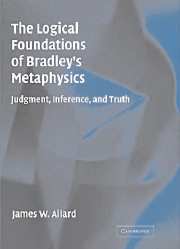4 - Conditional Judgments
Published online by Cambridge University Press: 04 September 2009
Summary
In his essay “General Propositions and Causality,” F. P. Ramsey described a way of evaluating conditionals that has inspired a great deal of subsequent reflection. He said,
If two people are arguing “If p will q?” and are both in doubt as to p, they are adding p hypothetically to their stock of knowledge and arguing on that basis about q. …
(1978b, 143n)Ramsey went on:
In general we can say with Mill that “If p then q” means that q is inferrible from p, that is, of course, from p together with certain facts and laws not stated but in some way indicated by the context. This means that p ⊃ q follows from these facts and laws, which if true is in no way a hypothetical fact; so that, in spite of the sound of inferrible, Mill's explanation is not circular as Bradley thought.
(1978b, 144–5)In this second quotation Ramsey sins against Bradley twice – first in attributing Bradley's view to Mill and second in thereby implying that Bradley did not hold it. The facts, however, are otherwise. What Ramsey calls Mill's explanation omits elements Mill emphasizes and adds elements first made explicit by Bradley.
In presenting his treatment of conditionals, Mill tries to show that conditionals have the same structure that other propositions have. For Mill a proposition is a “discourse, in which something is affirmed or denied of something” (Mill 1973–4, 21).
- Type
- Chapter
- Information
- The Logical Foundations of Bradley's MetaphysicsJudgment, Inference, and Truth, pp. 82 - 102Publisher: Cambridge University PressPrint publication year: 2004

